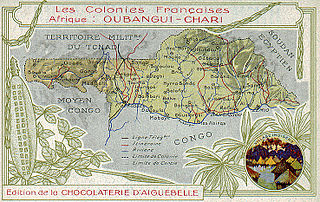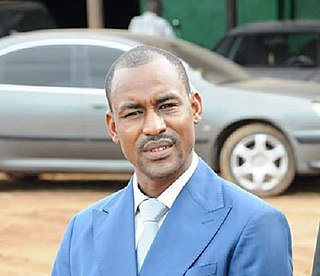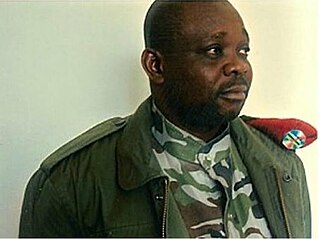Related Research Articles

The history of the Central African Republic is roughly composed of four distinct periods. The earliest period of settlement began around 10,000 years ago when nomadic people first began to settle, farm and fish in the region. The next period began around 10,000 years prior.

François Bozizé Yangouvonda is a Central African politician who was President of the Central African Republic from 2003 to 2013. He was the only Central African president born in modern-day Gabon.

Idriss Déby Itno was a Chadian politician and military officer who was the 6th president of Chad from 1991 until his death in 2021 during the Northern Chad offensive. His term of office of more than 30 years makes him Chad's longest-serving president.

The Chadian Civil War of 2005–2010 began on December 18, 2005. Since its independence from France in 1960, Chad has been swamped by civil wars between the Arab-Muslims of the north and the Sub-Saharan-Christians of the south. As a result, leadership and presidency in Chad drifted back and forth between the Christian southerners and Muslim northerners. When one side was in power, the other side usually started a revolutionary war to counter it.
Charles Massi was a Central African politician and rebel leader. Massi served as a minister in the government of the Central African Republic during the 1990s and again from 2005 to 2008; he was also the President of the Democratic Forum for Modernity (FODEM) party from 1997 to 2008. He became a rebel leader in 2008, heading the Convention of Patriots for Justice and Peace (CPJP).

The Central African Republic Bush War was a civil war in the Central African Republic which lasted from 2004 to 2007 between Union of Democratic Forces for Unity (UFDR) rebels and government forces. The rebellion began after François Bozizé seized the nation's presidency in 2003. Actual fighting began in 2004. Around 10,000 people were displaced because of the civil unrest.

The 2007-2009 Tuareg rebellion was an insurgency that began in February 2007 amongst elements of the Tuareg people living in the Sahara desert regions of northern Mali and Niger. It is one of a series of insurgencies by formerly nomadic Tuareg populations, which had last appeared in the mid-1990s, and date back at least to 1916. Populations dispersed to Algeria and Libya, as well as to the south of Niger and Mali in the 1990s returned only in the late 1990s. Former fighters were to be integrated into national militaries, but the process has been slow and caused increased resentment. Malian Tuaregs had conducted some raids in 2005–2006, which ended in a renewed peace agreement. Fighting in both nations was carried on largely in parallel, but not in concert. While fighting was mostly confined to guerrilla attacks and army counterattacks, large portions of the desert north of each nation were no-go zones for the military and civilians fled to regional capitals like Kidal, Mali and Agadez, Niger. Fighting was largely contained within Mali's Kidal Region and Niger's Agadez Region. Algeria helped negotiate an August 2008 Malian peace deal, which was broken by a rebel faction in December, crushed by the Malian military and wholescale defections of rebels to the government. Niger saw heavy fighting and disruption of uranium production in the mountainous north, before a Libyan backed peace deal, aided by a factional split among the rebels, brought a negotiated ceasefire and amnesty in May 2009.
Events from the year 2007 in Chad.
General Mahamat Nouri is a Chadian insurgent leader who currently commands the Union of Forces for Democracy and Development (UFDD). A Muslim from northern Chad, he began his career as a FROLINAT rebel, and when the group's Second Army split in 1976 he sided with his kinsman Hissène Habré. As Habré's associate he obtained in 1978 the first of the many ministerial positions in his career, becoming Interior Minister in a coalition government. When Habré reached the presidency in 1982, Nouri was by his side and played an important role in the regime.

The Kivu conflict is an umbrella term for a series of protracted armed conflicts in the North Kivu and South Kivu provinces in the eastern Democratic Republic of the Congo which have occurred since the end of the Second Congo War. Including neighboring Ituri province, there are more than 120 different armed groups active in the eastern Democratic Republic of Congo. Currently, some of the most active rebel groups include the Allied Democratic Forces, the Cooperative for the Development of the Congo, the March 23 Movement, and many local Mai Mai militias. In addition to rebel groups and the governmental FARDC troops, a number of national and international organizations have intervened militarily in the conflict, including the United Nations force known as MONUSCO, and an East African Community regional force.

The People's Army for the Restoration of DemocracyAPRD was a rebel group operating in the northwest of the Central African Republic (CAR). The APRD was formed in 2006 following the 2003 coup which overthrew President Ange-Félix Patassé. It is one of several groups which fought in the 2004-2007 Central African Republic Bush War. Initially claiming it wished to overthrow current CAR President François Bozizé, the APRD was the last of the three rebel coalitions to engage in the 2007 peace process. The group participated in the 2008 Inclusive Peace Dialog, and in early 2009 entered a coalition government with Bozizé and other civil and military oppositions groups.

Michel Am-Nondokro Djotodia is a Central African politician who was President of the Central African Republic from 2013 to 2014. He was the first Muslim to hold that office in the predominantly Christian country. Djotodia was a leader of the almost entirely Muslim Séléka rebel coalition in the December 2012 rebellion against President François Bozizé. Following a peace agreement, Djotodia was appointed to the government as First Deputy Prime Minister for National Defense in February 2013. When the peace agreement unravelled, Séléka captured Bangui and Djotodia took power on 24 March 2013. He promised to lead a transition to new elections in which he would not be a candidate, but his time in office was marked by escalating sectarian violence, and he was ultimately pressured into resigning by regional leaders on 10 January 2014.

The Central African Republic Civil War is an ongoing civil war in the Central African Republic (CAR) involving the government, rebels from the Séléka coalition, and Anti-balaka militias.

Séléka CPSK-CPJP-UFDR was an alliance of rebel militia groups that subjugated the Central African Republic (CAR) on 24 March 2013. After its official dissolution in September 2013, the remaining rebel groups became known as Ex-Séléka. Séléka leader Michel Djotodia became the nation's president from March 2013 until his resignation in January 2014. Members of Séléka were almost all Muslim.

An internal conflict in the Central African Republic (CAR) started essentially on 13 April 2013, when the government of President Michel Djotodia officially took over. The fighting was between the government of the Central African Republic's former Séléka coalition of rebel groups, who are mainly from the Muslim minority, and the mainly Christian anti-balaka coalition. The conflict was part of the ongoing Central African Republic Civil War (2012–present). International organisations, such as the United Nations, had warned of a possible genocide. UNSC resolution 2122 authorised the African-led International Support Mission to the Central African Republic (MISCA) to be deployed to the country, and France to lead operations with additional troops sent to bolster its force in the country. Following a summit of Economic Community of Central African States (CEEAC), including the attendance of all the country's MPs, Djotodia resigned from the presidency on 10 January 2014. The National Transitional Council chose Bangui mayor Catherine Samba-Panza as interim president on 20 January 2014. A period of lawlessness prevailed during the early days of her presidency with people moving into religiously cleansed neighbourhoods as the UN warned of a genocide. Anti-Balaka attacks continued against Muslim civilians.
Mahamat Abdoul Kadre Oumar, better known as Baba Laddé is a Chadian Fulani rebel opposing the Chadian regime of Idriss Déby. He is sometimes referred to as Abdel Kader Baba Laddé.

Ali Darassa Mahamat, also known as Ali Daras and Ali Ndarass is a Nigerian leader of the Central African rebel group, the Union for Peace in the Central African Republic (UPC), which is dominant around Bambari. He is an ethnic Fula and his UPC is largely Fula. Darassa was the right-hand man of Chadian rebel leader, Abdel Kader Baba-Laddé until Baba-Laddé abandoned his armed struggle in September 2012. The UPC is an Ex-Séléka faction made up of disbanded members of the former rebel coalition known as Séléka. Starting in November 2016, another Ex-Séléka faction, the FPRC, allied with their former enemy, the Anti-balaka, and attacked UPC. The fighting displaced 20,000 and was ethnic in nature with the FPRC singling out Fulani people. He is reportedly well studied in past UN peacekeeping missions in order to deal with the peacekeeping mission known as MINUSCA in the country.

In 2016, the Front for Change and Concord in Chad (FACT) and the Military Command Council for the Salvation of the Republic (CCMSR) began a rebellion against the Chadian government. From their rear bases in southern Libya, FACT and CCMSR have launched offensives and raids into Northern Chad seeking to overthrow the government of former president Idriss Déby, who had been in power since a December 1990 coup. Other rebel groups are also involved in the insurgency, though to a lesser extent.

Hassan Bouba is a minister of livestock and animal health in the Central African Republic and general of the Union for Peace in the Central African Republic armed group.

Abdoulaye Miskine is a Chadian-Central African warlord and a former Central African Armed Forces officer who served under Patasse Government. He was the leader of Democratic Front of the Central African People.
References
- AFP (2011-06-14). "Chad rebel group signs peace accord". AFP. Archived from the original on April 11, 2013. Retrieved 2013-03-25.
- AFP (2012-02-14). "Chad rebels threaten to advance on N'Djamena". AFP. Archived from the original on April 11, 2013. Retrieved 2013-03-25.
- IRIN (2012-10-09). "Central Africa: Boost for Peace As Rebel Group Disbands". UN Integrated Regional Information Networks. Bangui, CAR. Retrieved 2013-03-25.
- Debos, Marielle (2008-04-01). "Fluid Loyalties in a Regional Crisis: Chadian 'Ex-Liberators' in the Central African Republic". African Affairs. 107 (427): 225–241. doi:10.1093/afraf/adn004. ISSN 0001-9909. JSTOR 27667022.